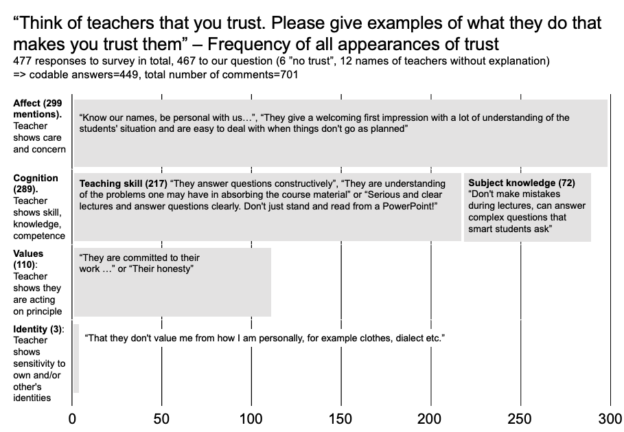In my series of things-I-want-to-say-in-an-upcoming-workshop-but-suspect-I-might-skip-to-make-time-for-participants’-topics, here one slide about a recent study I did with my colleagues Rachel Forsyth and Peter Persson when we got the chance to ask a question in the student-led “SpeakUp Days” survey at LTH. And it turns out: Student trust teachers who show that they care about students (most typically by asking questions, listening, and responding), and that show teaching skill.
We got 477 responses to the survey, out of which 467 answered our question: “Think of teachers you trust. Please give examples of what they do that makes you trust them!”. This is a super high response rate to an open question, and we think we owe it to both the perfect placement right on top of the survey, and also that the question seems to have been really relevant to students. We also get the relevance from the length of responses. Only 12 responses were names of teachers that students say they trust without any further explanation, and only six responses were that there are no such teachers. All other responses were descriptions of what teachers do that makes students trust them!
We looked at the data in different ways. Just reading through the answers, there were some things that jumped at us. Most notably, 19 responses used the verb “att dumförklara” to describe what teachers they trust do NOT do. We haven’t found a perfect translation, the closest we get is “to explain condescendingly”, implying talking down to someone in a way that makes that person feel stupid. So already not doing that builds trust with students!
We used the Felten et al. (2023) model on how teachers think about building trust in the classroom to code the 449 codable answers into different types of “teacher moves” (with some responses fitting up to three categories, leading to a total of 701 coded comments) and find that what students mention most often, 299 out of 449 responses, so 2:3, is facets of the teacher showing care and concern. In the featured image you see some example quotes of what that might sound like, e.g. the teachers “know our names, be personal with us…”, “give a welcoming first impression with a lot of understanding of the students’ situation and are easy to deal with when things don’t goo as planned”. Looking only at how often specific words are being mentioned, “understanding” appears 97 times, question/ask 87, listen 53, seeing 52, and answering 50 times. Clearly students trust teachers who ask, listen, and respond!
Next most important category with 289 mentions, so still mentioned by almost 2 our of 3 responses, is about cognitive aspects, that the teacher shows competence, skill, knowledge. But interestingly, there are two distinct ways in which teachers can do that: Through subject knowledge (“don’t make mistakes during lectures, can answer complex questions that smart students ask”) or teaching skill (“They answer constructively”, “They are understanding of the problems one may have in absorbing the course material”, “serious and clear lectures and answer clearly. Don’t just stand and read from a powerpoint!”). So what would you guess what the relative importance of subject knowledge vs teaching skill would be? Turns out it’s 3:1 for teaching skill: teaching skill with 217 codes, subject knowledge with 72. As we know from an accompanying interview study, students put a lot of trust into teachers’ subject knowledge based on the fact that LTH, which they have a lot of trust in, has chosen to employ that teacher. That is actually quite an encouraging result for many of the new teachers I meet in our workshops that are completely stressed out about not being the expert-est expert on the subject, when all they really need to do is be kind and put effort into their teaching!
The third category that is mentioned is “values” with 110 mentions of how the teacher shows they are acting on principle, for example that “they are committed to their work” or “their honesty”.
Lastly, there were only 3 mentions of the teacher showing sensitivity to their own and/or other’s identities, “that they don’t value me from how I am personally, for example clothes, dialect, etc”.
So the main point I want to make with this slide in my workshop, after having made the point that trust is important for student learning, is that building trust can really be very easy. Show students that you care, and put some effort into your teaching!
Felten, P., Forsyth, R., and Sutherland, K. A., 2023. “Building Trust in the Classroom: A Conceptual Model for Teachers, Scholars, and Academic Developers in Higher Education”. Teaching and Learning Inquiry 11 (July). https://doi.org/10.20343/teachlearninqu.11.20.

Pingback: Reading about building and rebuilding trust in higher education (Lewicka, 2022) - Adventures in Oceanography and Teaching